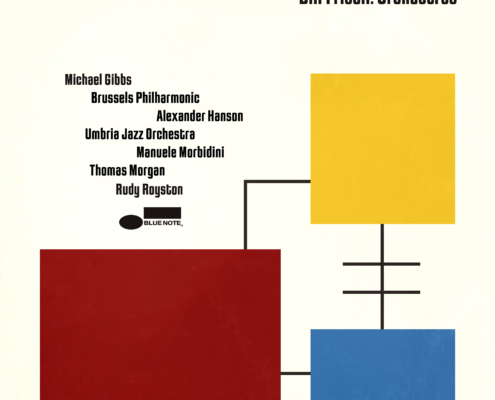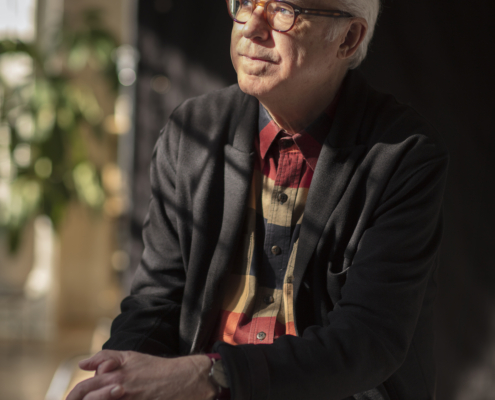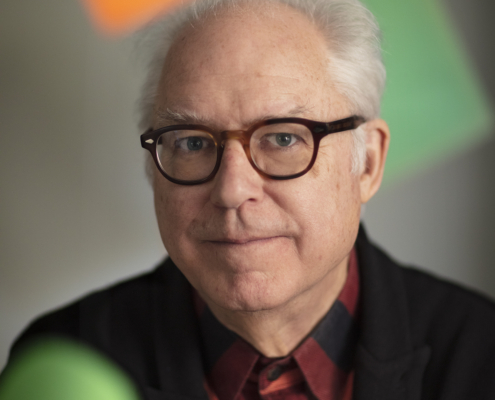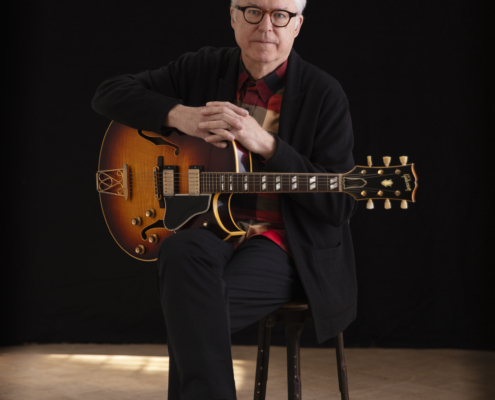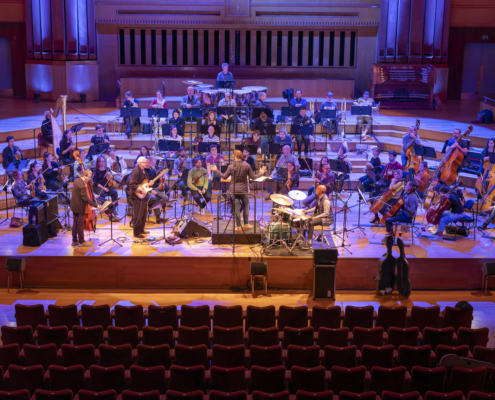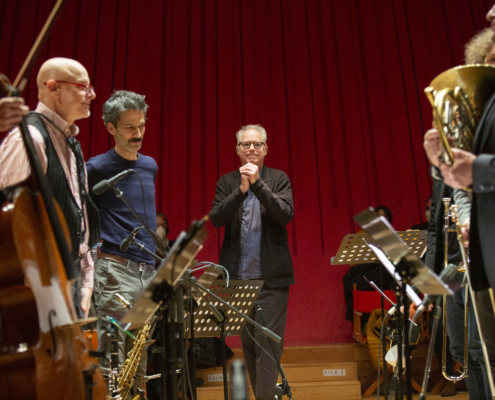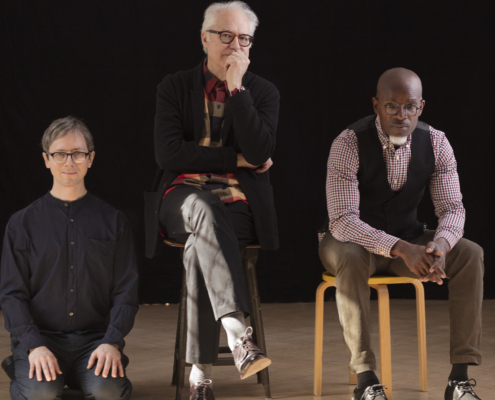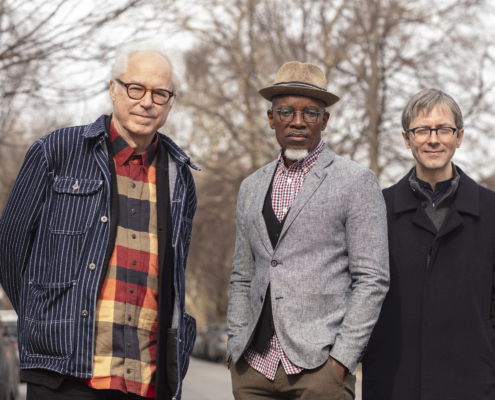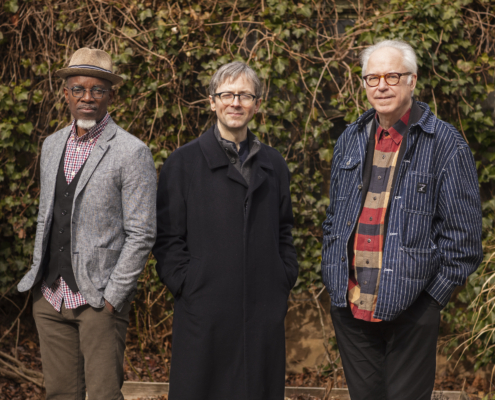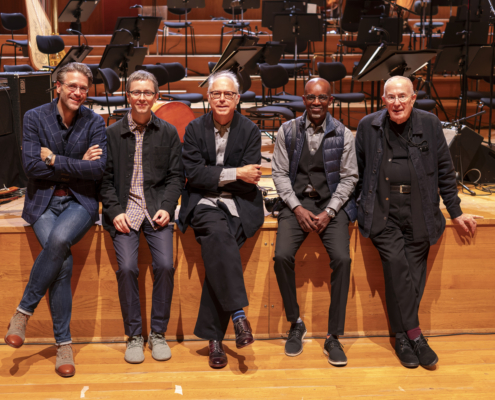Bill Frisell – Orchestras
CD + LP 1
With The Brussels Philharmonic
- Nocturne Vulgaire
- Lush Life
- Doom
- Rag
- Throughout
- Electricity
- Sweet Rain
- Richter 858, No.7
- Beautiful Dreamer
CD + LP 2
With Umbria Jazz Orchestra
- Lookout for Hope
- Levees
- Strange Meeting
- Doom
- Electrcity
- Monica Jane
- We Shall Overcome
LP 3
With Brussels Philharmonic
(JazzEcho-Store-3-LP Only)
- Be That as It May
- Drum Solo
- Moon River
- Lotus Blossom
- Monroe
- A Flower is a Lovesome Thing
- What the World Needs
Now is Love
Bill Frisell Trio:
Bill Frisell – guitar / Thomas Morgan – bass / Rudy Royston – drums
Orchestras arranged by Michael Gibbs / Produced by Lee Townsend
Dass Gitarrist Bill Frisell sein Instrument wie ein Orchester klingen lassen kann, war schon öfter zu lesen und zu hören. Sein neues Album „Orchestras“ dokumentiert jetzt zwei inspirierte Konzerte, die Frisell mit seinem langjährigen Trio mit Bassist Thomas Morgan und Schlagzeuger Rudy Royston und zwei berühmten Orchestern gegeben hat, der fast 60-köpfigen Brussels Philharmonic und dem 11-köpfigen Umbria Jazz Orchestra. Arrangiert hat die bei beiden Konzerten aufgeführten Werke niemand Geringeres als der inzwischen 86-jährige legendäre Michael Gibbs, mit dem Frisell bereits wiederholt gearbeitet hat.
Die stimmungsvollen, komplexen Aufführungen gehen weit über das hinaus, was handelsübliche „mit Streichern“-Projekte im Jazz zu bieten haben. Die vielschichtige, wogende Orchestrierung erinnert mal an Third-Stream-Werke, mal an anspruchsvolle Filmmusik und mal an Genre-sprengende Meister wie Gil Evans. Bill Frisells charakteristischer, schimmernder Gitarrenklang verschmilzt auf faszinierende Weise mit dem symphonischen Klang der Streicher und Blechbläser.
Eine 3-LP-Version des Albums, in Deutschland exklusiv im JazzEcho-Store erhältlich, enthält eine dritte LP mit sieben weiteren Aufnahmen zusammen mit der Brussels Philharmonic.
INFO
In the trio format he’s favored throughout his career, the guitarist and composer Bill Frisell has always projected an orchestral scope — through his remarkably complete sense of harmony, a unique gift for melodies that remain with you long after a performance, and a keen feel for how dynamic range can be used to convey emotion. But on his new double album, his fourth release for Blue Note Records, he makes those symphonic evocations a reality. Produced by Lee Townsend, Orchestras documents two inspired concert-hall engagements arranged by Michael Gibbs for Frisell’s long-standing trio with bassist Thomas Morgan and drummer Rudy Royston: one featuring the nearly 60-piece Brussels Philharmonic, conducted by Alexander Hanson; and one with the 11-piece Umbria Jazz Orchestra, under the musical direction of Manuele Morbidini.
As he’s often done over the past four decades, Frisell uses a straightforward concept and a familiar songbook to bring about stirring revelations. To start, these 16 tracks showcase a level of comfort and interactivity that far transcends the vast majority of “with strings” projects on the jazz record shelf. Gibbs’ sweeping, singular orchestration, with its shades of Gil Evans and landmark film scores, moves nimbly within and around the trio’s telepathic rapport, and Frisell’s shimmering trademark tone melds gorgeously with strings and brass.
Without really having to read music or play parts, the trio was “completely free to do what we wanted,” Frisell says, in collaboration with conductors and musical directors who were “breathing together and moving together” with the guitarist’s band. The result is a rare recording in which a sprawling symphonic ensemble moves as if by intuition, urging one of jazz’s best small groups toward their next spontaneous discovery. “The idea is that we’re always going to be on the edge of what we know,” Frisell says, “or hopefully off the edge of what we know, into some sort of uncharted territory. We were still playing whatever comes into our imagination.”
The roots of this agility can be found in Frisell’s half-century-deep relationship with Gibbs, among the most ingenious composer-arrangers in jazz history, whose visionary writing opened new pathways for modern jazz and for jazz’s ability to pull from adventurous rock and pop. Or, as Frisell describes his now 86-year-old lodestar: “a hero. … teacher, mentor, friend, imaginator, instigator, door opener, uplifter, positive thinker, enthusiastic harmonizer.”
In conversation, Frisell relishes the serendipitous encounters and surprising connections that have built his extended musical family, and his partnership with Gibbs is no different. The guitarist begins not far from the very beginning, in 1968, when he and his father got tickets to the George Wein-produced “Schlitz Salute to Jazz” tour that was stopping at Red Rocks, just outside Frisell’s hometown of Denver, on July 20. Then 17, Frisell was eagerly anticipating an appearance by guitar god Wes Montgomery.
Tragically, Montgomery passed just a month before the concert, only 45, but Frisell and his father soldiered on to hear the rest of the acts on the bill. Again and again that day, Frisell’s mind was blown: He took in Cannonball Adderley, Thelonious Monk and a quartet led by the great vibraphonist Gary Burton with guitarist Larry Coryell, bassist Steve Swallow and drummer Bob Moses. It was a variation on a quartet that had recently innovated fusion with the seminal LP Duster. What Frisell would discover later was that a sizable chunk of that band’s progressive repertoire — including a stunningly pensive ballad called “Sweet Rain” — came from Gibbs’ pen. “He wasn’t in the band,” Frisell reflects, “but he was causing this sound to happen.”
Frisell’s music education flourished, and he absorbed more Burton LPs with Gibbs’ original music, Gibbs’ own vivid large-ensemble recordings, Stan Getz’s 1967 take on “Sweet Rain” and Gibbs’ orchestrations for Jaco Pastorius, Mahavishnu Orchestra, Joni Mitchell and others. At a certain point during his teenage years, Frisell remembers, “it became clear that all I wanted to do was play.”
In the mid-’70s, Frisell headed East for a second turn at Berklee, “and by some miracle, Mike had just arrived there to teach. It was like winning the lottery for me. I took whatever classes of his I could get.” The guitarist remembers Gibbs as an exceedingly good-natured and supportive educator who shared meals with students and dropped in on their gigs. “I’d see him standing in the back,” Frisell recalls, “and one time he really complimented me on my playing.”
Empowered by the feedback, Frisell picked up the phone and pitched Gibbs on including him in his student band — “one of the most aggressive moves I’ve made,” Frisell chuckles, “and there were like three guitar players in the band.” That experience led to Frisell’s “first real tour,” filling in for the Belgian guitarist Philip Catherine on British dates with Gibbs’ band including Charlie Mariano, Kenny Wheeler and other masters. Frisell bonded with bassist Eberhard Weber over a nightly improvised duet, which led to the guitarist’s first session for the venerated ECM label, Weber’s 1979 LP Fluid Rustle featuring Gary Burton. The rest, as they say, is history.
Gibbs continued to “plant seeds” in the guitarist’s career, especially after they reconnected in New York in the ’80s, and the two have worked together brilliantly over the years; to name but one example, the guitarist speaks with a kind of wistful, pinch-me reverence when he recalls their contributions to Marianne Faithfull’s 1987 album Strange Weather, produced by Hal Willner. But their shared story and mutual respect have never been more fully and winningly expressed than they are throughout Orchestras.
The program here acts as a kind of compilation for Frisell’s richly varied catalog, with oft-performed Frisell compositions like “Strange Meeting” and “Monica Jane” sharing space with his go-to standards and traditional numbers, among them Billy Strayhorn’s “Lush Life,” Stephen Foster’s “Beautiful Dreamer” and the protest anthem “We Shall Overcome,” given a triumphant, electrified reading in Italy. Two performances of Ron Carter’s “Doom” — which jazz fans will recognize as “Mood,” off Miles Davis’ E.S.P. — reach Bernard Herrmann levels of noir-tinted atmosphere, as does Gibbs’ overture of sorts, “Nocturne Vulgaire.” Gibbs’ arrangement for a take of “Sweet Rain,” in Belgium, works in perfect concert with Frisell’s porcelain signature sound to conjure up classic cinema, and much of Orchestras follows suit, as if scoring Hitchcock and Fritz Lang features anew.
Throughout Orchestras, the reciprocal flow of influence and admiration between Frisell and Gibbs is palpable. To begin, Gibbs’ dedication to and understanding of the musicians he’s writing for gives him the ability to use their harmonic and sonic aesthetic to inform his arranging. “If he listens to me play,” Frisell says, “he’s hearing the overtones of what it is I’m playing, and he has a way of expanding my own sound. It’s like if you hit one note on the piano real hard and push the pedal down, you hear this rainbow happening above the note.”
Of course, Frisell’s tender filigree complements Gibbs’ work impeccably as well. “It goes in the other direction too,” he says. “So many of my choices over all these years, my sense of harmony and dissonance… I really learned so much from him.”
CREDITS
CD + LP 1
Featuring Brussels Philharmonic
- Nocturne Vulgaire (3:15)
Composed by Michael Gibbs
- Lush Life (5:09)
Written by Billy Strayhorn
- Doom (4:47)
Written by Ron Carter
- Rag (4:26)
Written by Bill Frisell
- Throughout (6:01)
Written by Bill Frisell
- Electricity (5:55)
Written by Bill Frisell
- Sweet Rain (5:57)
Composed by Michael Gibbs
- Richter 858, No.7 (7:04)
Written by Bill Frisell
- Beautiful Dreamer (3:15)
Written by Stephen Foster
Bill Frisell: guitar
Thomas Morgan: bass
Rudy Royston: drums
Brussels Philharmonic
Alexander Hanson: Conductor
Otto Derolez: Concertmaster
Recorded September 23 and 24, 2022 at De Bijloke, Ghent, Belgium and Flagey, Brussels,
Belgium
Live Recording Engineer and pre-mixing: Patrick Lemmens, High Score Recording
CD + LP 2
Featuring The Umbria Jazz Orchestra
- Lookout for Hope (7:09)
Written by Bill Frisell
- Levees (4:28)
Written by Bill Frisell
- Strange Meeting (6:23)
Written by Bill Frisell
- Doom (6:30)
Written by Ron Carter
- Electricity (4:09)
Written by Bill Frisell
- Monica Jane (6:49)
Written by Bill Frisell
- We Shall Overcome (4:48)
Traditional, Arranged by Bill Frisell
Bill Frisell: guitar
Thomas Morgan: bass
Rudy Royston: drums
The Umbria Jazz Orchestra
Manuele Morbidini: Music Director
Recorded December 30, 2021 – January 1, 2022 at Teatro Mancinelli, Orvieto, Italy
Live Recording Engineers: Marco Melchior, Claudio Venturelli
Additional recording by Adam Muñoz at 25th St. Recording, Oakland, California
KONZERTE BILL FRISELL TRIO
09.05.24 Berlin Emmauskirche / XJAZZ
13.05.24 Oberhausen Ebertbad
12.07.24 Tübingen Sudhaus
Weitere Infos in unserem Presseportal unter
https://journalistenlounge.de – bitte dort über den Genrefilter „Jazz“ anwählen!
PR Radio
Universal Music Jazz (Deutsche Grammophon GmbH)
Mühlenstr. 25, 10243 Berlin
CD 00602458837339 / 2-LP 00602458837407
VÖ: 19.04.2024
Live
KONZERTE BILL FRISELL TRIO
09.05.24 Berlin Emmauskirche / XJAZZ
13.05.24 Oberhausen Ebertbad
12.07.24 Tübingen Sudhaus

